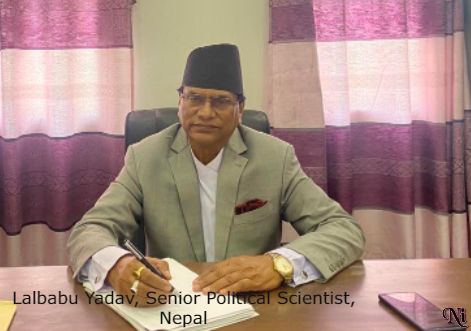Lal babu Yadav
Associate Professor
Central Department of Political Science
Tribhuban University
Constituent Assembly member, Nepal
Introduction:
When we think of national security of Nepal, the basic guiding document in this regard is the Constitution of Nepal 2015 itself and the subsequent laws made based on it thereafter.
The Constitution defines Nepali state as federal democratic republic.
Not only this, the Constitution also defines Nepal as a secular state and would also equally look and protect the age old religious and cultural tradition of the land.
It also rests sovereignty of the state on Nepali citizen.
These certainly are very good aspects of the Constitution.
In addition to there are other factors, which make the Constitution more forward looking. It also clearly defines the national security per se factors.
The national security is related with national interest and the Chapter one, Article five of the Constitution lay emphasis on the national interests and explains that safeguarding freedom, sovereignty, territorial integrity, nationality, independence, and dignity of Nepal will be the uppermost priority of the state.
It further elaborates that rights of Nepali people, border security, economic well-being and prosperity shall be the basis elements of Nepal’s national interest.
Any conduct and act contrary to the national interest shall be punishable by federal law.
This being said, the national interest and national security are inherently connected with each other and any threat to national interest would be tantamount to the threat to national security.
So how should state like Nepal protect its national interests in order to enhance and protect its national security paradigm?
There are many challenges in today’s world that nation-state are facing. We can only draw a good national security doctrine if we understand these challenges in a nutshell.
Challenges:
Today, almost all countries across the world are facing numerous threats emanating from various issues such as migration, cyber terrorism, environmental crisis, climate change, attacks from the terrorist groups, rise of non-state actors, outbreak of contagious diseases like Covid-19, ethnic, racial and religious conflict, poverty, economic inequality among others are posing real threat to the national security. While some of these are internal but they, too, have their external dimensions as well.
Factors like these generate not only inter-state security crisis but they, too, generate intra-state crisis as well. Nepal in the past witnessed insurgency and there are chances that in the days to come it may faces other security threats.
The Growing geopolitical interests in Nepal would pose challenges to national security. In fact Security is not just about the absence of fear but is also related to the livelihood guarantee and the state’s ability to exercise legitimate monopoly of power, which form essential preconditions to subdue internal chaos, break criminal networks and forge partnership with international community. What is needed in our context is synthesizing the universal values of democracy with the specific needs of the nation to effectively apply the national security.
The Information and communications technology (ICT) -induced socio-economic changes, geopolitical considerations, globalization and seismic political upheavals have emerged as chief factors in defining national security.
Citizens need to demonstrate patriotic feeling while the political parties must rise above petty interests to implement national security robustly. Given the diverse problems, Nepal needed the new security architecture required fulfilling human development, security-citizens ties, economic, diplomatic, military and communications effectiveness, anticipatory planning and security alertness and early disaster preparedness.
The conventional threat posed by inter-state conflict has become moderated while intra-state conflicts have increased with the emergence of critical ‘minority’ stoked by both informational revolution and geopolitical penetration.
Now the time has come to bind the fragmentation of Nepalese society, weaving individuals, families and communities and strengthening social connections of citizens with the state.
Going by the Constitutional provisions, the method would be to look into the three factors.
Alternatively, what can be taken from the above paragraph is that three important factors needs to be taken into consideration while keeping the national interest and national security for that matter intact.
They are: Traditional Security issues, Non-traditional security issues and issues related to Human Security. They can also be said like external, internal and human security factors.
Traditional security Issues:
Like many countries, which is obvious in the comity of the state, the traditional security issues are of no less importance despite the various changes brought about by the globalization per se factors.
Traditional security issues shall remain there and in many cases these issues are coming even more forcefully primarily because countries are thinking more about themselves.
The Covid-19 has further brought new momentum to these issues and they certainly will gain further momentum in the days to come.

Internal Factors:
The management of internal factors is the most important factor to maintain national security.
Internal factors entail many elements spanning from the political management to the management of the basic needs of the people.
The perpetual political instability also poses security threat to the state.
In the context of Nepal, there are high chances, as we said, earlier of erupting political instability if we cannot internal manage ourselves.
The biggest problem is the how do we strike a balance between the interests of competing groups.
Equally important is the management of non-state actors who might pose national threat in the event of not fulfilling their demands.
External Factors:
External factors are those which pose direct threat to the territorial security of the Country (not state) and people residing within that territory.
In the context of Nepal, there are no imminent threats coming from the external elements but this does not necessarily mean that we do not need to take this factor into consideration.
There are some latent threats which partly have emerged from the latest political restructuring of the state (the federalism).
This certainly needs to be taken serious consideration in the light of simmering in the Southern belt.
There are external factors (not necessarily our immediate neighbors who might be having certain vested objectives to serve their own national interests by destabilizing Nepal’s security concern.
Human Security is another important factor when it comes to the point of national security.
Human security is all about the security of the human being living in that particularly territory.
The concept of security in relation to human security is very broad.
It contains both internal and external factors and factors beyond the reach of humanity meaning the problems brought about by climate change, natural calamities, and of latte the cyber security.
Therefore minimum basic needs (living means) as well as the security from other factors mentioned just above are quite important and needs to be taken into consideration when it comes to the point of national security.
This being said state be able to effectively mobilize the elements of good governance here. In the absence of doing so, many nation states fall apart and national security becomes jut anathema.
In sum, ensuring freedom from and freedom from wants are the basic tenets of any national security.
Conclusion:
The dimension of national security entails many factors.
The potential factors that may causes are numerous and their number is increasing day by day.
Yet, some of the important factors that may have impact on security of the any state also depend as how does it govern itself.
This being said, national insecurity include actions by other states (e.g. military or cyber attack), violent non-state actors (e.g. terrorist attack), organized criminal groups such as narcotic cartels, and also the effects of natural disasters (e.g. flooding, earthquakes).
So in order to tackle these problems – the most important priority would be to strengthen the capacity of the state bearing institutions and strike a right balance in domestic and international policy as well.
Equally important is to state also need to bring its people on its fold. Nepal should develop its national security strategy by incorporating short and long term objective of the state vis-à-vis security which can provide blue print to work during the time of crisis.
End text.
References:
Samuel P Huntington. The Soldier and the State: The Theory and Politics of Civil–Military, Belknap Press: An Imprint of Harvard University Press; Revised Edición (15 Septiembre 1981).
Samuel P Huntington,The Clash of Civilizations and the Remaking of World Order¸ Simon & Schuster; a Edition (2 August, 2011).
Mary Kaldor, Human Security, Polity; 1st edition (22 Oct, 2007).
Norman A. Graebner, The National Security: Its Theory and Practice, 1945-1960, Oxford University Press; 1st edition, August, 1986.
Williamson Murray, National Security Challenges for the 21st Century, Strategic Studies
Institute, First edition, 2003.
Sridhar Khatri, Health and Human Security in Nepal and Possible Trajectories for 2025. NBR Special Report no. 36 available at https://www.nbr.org/publication/health-and-human-security-in-nepal-and-possible-trajectories-for-2025/
The Constitution of Nepal 2015. Nepal Law Society.
End text.
# Thanks the distinguished author Shri Lal Babu Yadav-senior political scientist, Nepal.
#Our contact email address is: editor.telegraphnepal@gmail.com

